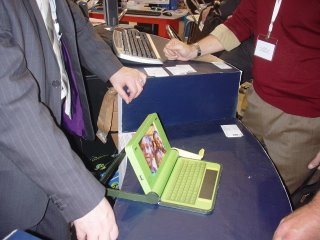 Recently Nicholas Negroponte came to the ITU Telecom World 2006 in Hong Kong in order to promote his One Laptop per Child campaign. These days he is not travelling around any longer with a not-working prototype of the $100 computer as the first ones have rolled off the production line. At the conference in Hong Kong Negroponte said that he hoped to distribute between three and five million of these innovative laptops to children in six developing countries in 2007. The project has had its critics, both from the developed and developing world. But Negroponte is certain he is on the right track and makes a very compelling point. This is an education project, not a laptop project. As he said in an interview here for silicon.com: ‘People say if a child is malnourished, he doesn’t have drinking water, he’s sick, why do you want to give him a laptop? Substitute the word ‘education’ for ‘laptop’ and you will never ask that question again.’
Recently Nicholas Negroponte came to the ITU Telecom World 2006 in Hong Kong in order to promote his One Laptop per Child campaign. These days he is not travelling around any longer with a not-working prototype of the $100 computer as the first ones have rolled off the production line. At the conference in Hong Kong Negroponte said that he hoped to distribute between three and five million of these innovative laptops to children in six developing countries in 2007. The project has had its critics, both from the developed and developing world. But Negroponte is certain he is on the right track and makes a very compelling point. This is an education project, not a laptop project. As he said in an interview here for silicon.com: ‘People say if a child is malnourished, he doesn’t have drinking water, he’s sick, why do you want to give him a laptop? Substitute the word ‘education’ for ‘laptop’ and you will never ask that question again.’The One Laptop per Child has its followers. Presently the telecom company Celtel International, based in Hoofddorp, The Netherlands is looking into a $10 mobile phone. The company is active with telecom and especially mobile in the African continent. Recently I met a representative of Celtel and had a talk about the project. He insisted that the company is looking into the project and has not yet taken the decision to have the mobile phone produced and rolled out. The company is presently researching the production methods and talking to mobile phone and chip manufacturers.
The plan of One Mobile per Child – it is not a project yet – has its advantages and his critics. The advantage would be to stimulate the mobility and the economy of Africa. Despite the fact that a heavy investment will be needed, the mobile roll out would be cheaper than creating a fixed line infrastructure. Setting up a mobile infrastructure with masts takes less time than digging ducts. The plan could also contribute by micro-education, learning by mobile phone. But this plan has also its critics. Of course the plan would upset the growth curve of the mobile phone companies in Africa. Now it still is seen as a growth area. But the companies would also look at the fraud aspect. How do you ensure that these cheap mobiles get to the right people and prevent fraud. The Negroponte project had a solution for that: the colour of the computer. The computer had a kind of green radio-active colour, which made them hard to sell on the market, so the organisers reasoned. A similar idea could be used in this plan.
Tags: mobile
RSS feed: http://buziaulane.blogspot.com/rss.xml
Blog Posting Number: 604

No comments:
Post a Comment